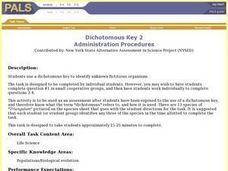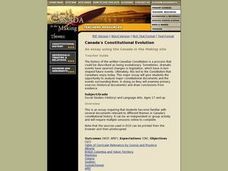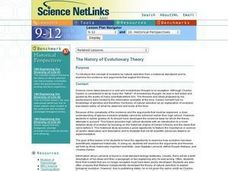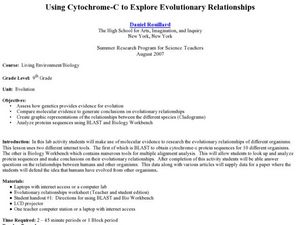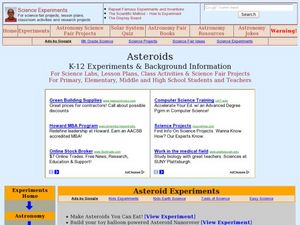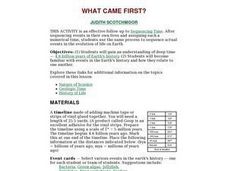Curated OER
The U.S. Constitution:Continuity and Change in the Governing of the United States
Students interpret historical evidence presented in primary and secondary resources. In this U.S. Constitution lesson, students examine and analyze primary sources regarding the plan for U.S. government.
Curated OER
Human Evolution
High schoolers make and use observations of Laetoli footprints to provide clues to life in the past. They collect and analyze data to study the relationship between foot length and body height.
National Constitution Center
Creating Your Own Town Hall Poster
Middle and high schoolers are walking into a world rife with strong political viewpoints and vocal opinions. Help to prepare them for controversial discussions with a lesson in which they choose, research, and learn more about a...
Curated OER
13 Ways to Tell Time Backwards
Learners explore different ways geological time can be measured: comparing the time dimensions for each method, the mechanisms of each method, and the materials used.
Curated OER
From Wolf to Dog
Students explain how dogs evolved from wolves based on the video. In this biology lesson, students research about breeding animals for specific traits. They interview dog owners and create a presentation about the dog.
Curated OER
Dichotomous Key 2
Students use a dichotomous key to identify unknown fictitious organisms in an assessment designed to be used after a discussion on the use of a dichotomous keys has occurred. Follow up questions about key included.
Curated OER
AP: Chapter 26: Origin of Life
Five pages take biologists on a generalized survey of the origin of life. Queries are made regarding theories of how life developed, ancient Earth conditions, and the ever-changing field of taxonomy. The experiments of different...
Curated OER
Canada's Constitutional Evolution
Students research and write an essay relevant to different themes in Canada's Constitutional History.
Curated OER
The History of Evolutionary Theory
Learners are introduced to the concept of evolution by natural selection from a historical standpoint. They examine the evidence and arguments that support the theory of natural selection.
Curated OER
Using Cytochrome-C to Explore Evolutionary Relationships
Young scholars analyze protein sequences. In this lesson on determining evolutionary relationships, students use the Internet tools BLAST and Biology Workbench to look at protein sequences. Young scholars will compose an essay that...
Curated OER
Why Cladistics?
Students explore how biological classification is intimately associated with evolution.
Curated OER
Asteroids
Students examine a potential asteroid impact site. They describe evidence and theories for extinction events.
Curated OER
Hominoid Skull Comparison
Students are provided with evidence used to support evolutionary theory. They are introduced to classification by using primates as an example. Students read article related to Hominoid Skull Comparison and write a summary about the...
Curated OER
The Flat Earth
Students use scientific explanations to discuss the shape of the Earth. In this research based lesson, students will explore various concepts about how scientist use evidence to determine if the Earth is flat or round. Students will hold...
Curated OER
New Technologies
Students analyze how technology has changed over time. They identify technologies that did not exist in the past and might be invented in the future and design a poster that illustrates the evolution of one kind of technology and...
Curated OER
The Crusty Fossils
Students identify some of the different species of crabs and tell how they adapt themselves to their environment. They discuss the evolution and stages of development of the crabs. They identify the Phylum Arthropoda and the Class...
Smithsonian Institution
Of Human Bondage: George Washington and The Issue of Slavery
Learners read and interpret four documents George Washington wrote regarding his slaves. They analyze why George Washington was conflicted over the issue of slavery. They discuss the evolution of Washington's attitude toward slavery.
Curated OER
Archaeological Study
Students analyze the difference between archaeology and anthropology while studying the evolution of different products. In this archaeology and anthropology lesson, students trace the progression of a certain tool or product and come up...
Curated OER
Explorations Through Time
In this earth history worksheet, high schoolers visit a website and complete 15 fill in the blank and 8 short answer questions based on what they read. Topics include biodiversity, animal kingdoms, evolution, fossils, and extinction.
Curated OER
Studying Fossils
Students study the Evolution in the Light of Fossils. Activities in this lesson range from quantitative measurements of hominoid skulls to the comparison of hominoid bone structures. They hypothesize dinosaur size and speed by looking at...
Curated OER
Why do we need Vitamin C in our diet? Or Why do we carry old inactive genes in our genome?
Students explore and explain how mutations in the DNA sequence of a gene may be silent or result in phenotypic change in an organism and in its offspring. They analyze how evolution and biodiversity are the result of genetic changes that...
Curated OER
Who Stole My Salad?
Eighth graders explain how protein is made in the cell. In this biology lesson, 8th graders translate RNA and DNA using an internet database. They determine the thief based on evidence collected.
Curated OER
What came first?
Young scholars sequence events in their own lives and assign each a numerical time, students use the same process to sequence actual events in the evolution of life on Earth.
Curated OER
Mechanism of Our Eyes
Students study the eye as the organ of vision, They look at a drawing of the eyes and study the names of the parts. While working with a partner, they observe what happens when the lights are turned lower and lower. Finally, they look at...
Other popular searches
- Dna Evidence for Evolution
- Fossil Evidence of Evolution
- Evidence for Evolution Whale
- Evolution Evidence
- Fossil Evidence Evolution







